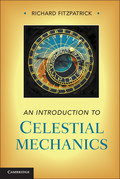Book contents
- Frontmatter
- Contents
- Preface
- 1 Newtonian mechanics
- 2 Newtonian gravity
- 3 Keplerian orbits
- 4 Orbits in central force fields
- 5 Rotating reference frames
- 6 Lagrangian mechanics
- 7 Rigid body rotation
- 8 Three-body problem
- 9 Secular perturbation theory
- 10 Lunar motion
- Appendix A Useful mathematics
- Appendix B Derivation of Lagrange planetary equations
- Appendix C Expansion of orbital evolution equations
- Bibliography
- Index
Preface
Published online by Cambridge University Press: 05 August 2012
- Frontmatter
- Contents
- Preface
- 1 Newtonian mechanics
- 2 Newtonian gravity
- 3 Keplerian orbits
- 4 Orbits in central force fields
- 5 Rotating reference frames
- 6 Lagrangian mechanics
- 7 Rigid body rotation
- 8 Three-body problem
- 9 Secular perturbation theory
- 10 Lunar motion
- Appendix A Useful mathematics
- Appendix B Derivation of Lagrange planetary equations
- Appendix C Expansion of orbital evolution equations
- Bibliography
- Index
Summary
The aim of this book is to bridge the considerable gap that exists between standard undergraduate mechanics texts, which rarely cover topics in celestial mechanics more advanced than two-body orbit theory, and graduate-level celestial mechanics texts, such as the well-known books by Moulton (1914), Brouwer and Clemence (1961), Danby (1992), Murray and Dermott (1999), and Roy (2005). The material presented here is intended to be intelligible to an advanced undergraduate or beginning graduate student with a firm grasp of multivariate integral and differential calculus, linear algebra, vector algebra, and vector calculus.
The book starts with a discussion of the fundamental concepts of Newtonian mechanics, as these are also the fundamental concepts of celestial mechanics. A number of more advanced topics in Newtonian mechanics that are needed to investigate the motions of celestial bodies (e.g., gravitational potential theory, motion in rotating reference frames, Lagrangian mechanics, Eulerian rigid body rotation theory) are also described in detail in the text. However, any discussion of the application of Hamiltonian mechanics, Hamilton-Jacobi theory, canonical variables, and action-angle variables to problems in celestial mechanics is left to more advanced texts (see, for instance, Goldstein, Poole, and Safko 2001).
Celestial mechanics (a term coined by Laplace in 1799) is the branch of astronomy that is concerned with the motions of celestial objects—in particular, the objects that make up the solar system—under the influence of gravity.
Information
- Type
- Chapter
- Information
- An Introduction to Celestial Mechanics , pp. ix - xPublisher: Cambridge University PressPrint publication year: 2012
